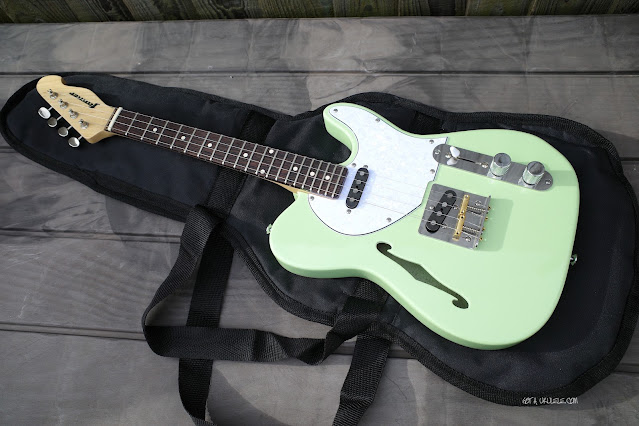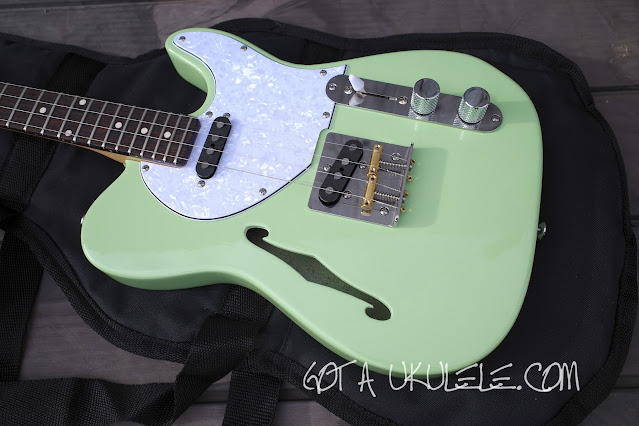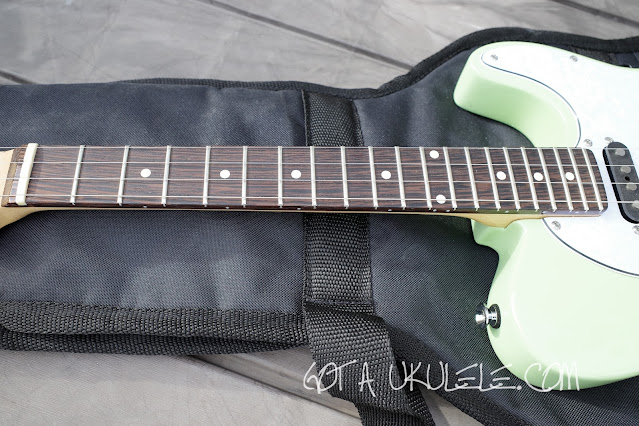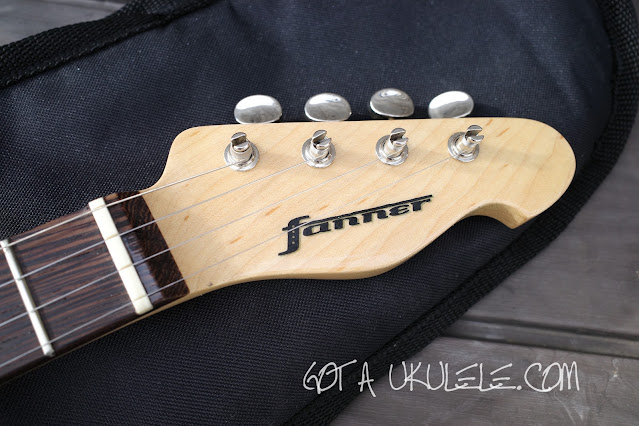I've been longing to get a ukulele from this brand on the site for many years. I'm pleased to say we have something sorted. This is the Pixelator Thinline Tenor Ukulele from Fanner Guitar Works.
Fanner Guitar Works are a small family run business from the Western Cape, South Africa, run by brothers Brian and Mark Fanner. They started out on the guitar road in the early 2000's making oil can guitars, but moved into ukulele (and tenor guitar) building in 2014. They are all hand made in South Africa by the team and come in a dizzying range of styles (not just Fender styles), with this one being based on the thinline Telecaster. If there is one thing I like about a hand made product it's the amount of choice you get in the spec process. So with Fanner it's not just a choice of body styles but an absolutely dizzying array of custom options available to you. I'll point some of those out as we go through the review, but needless to say you'd find it hard not to find an option that ticks whatever boxes you may need ticking.
I also 'get' that solid, steel strung electrics are not for everybody, but there is no getting away from the fact that models from brands like RISA and Flight have proven so very popular that at times they can be hard for the stores to keep up with demand. Fanner are not a new brand - I've known about them for a while and know they too have their fans, and as I say above and through this review they are very much NOT the usual factory line builds.
SUMMARY VIDEO REVIEW
So the Pixelator is based on the Telecaster shape and is available as either a straight solid body or 'thinline' hollowbody like this one. It's available the 17" tenor scale like this one but also a 19 and 20" scale baritone and a tenor guitar. In standard spec as this one is, the body is made from Meranti wood taken from their own stock of reclaimed woods at their shop, but you also get a choice of other select timbers for an additional charge. I'm perfectly happy with the choice of Meranti, and not least because it's reclaimed wood which gives them a big tick on sustainability. It's typically Telecaster in shape and the body is CNC cut and then hand sanded and routed to finish it.
The bridge is modelled on a Tele bridge and the choice of going with two brass barrel saddles with have traditional Telecaster purists drooling! They sit on a simple chrome bridge which is worth a word also. Fanner explain that whilst they do have to buy some hardware in they like to create / source as much of it as they can. As such the steel plates on these are cut for them in Cape Town and then polished in the Fanner workshop. The strings here terminate with ball ends against the bridge plate rather than through the body in true Tele style. String spacing here is 36mm.
Next to the bridge is the control plate for the volume and tone and three way pickup selector which again is typically Tele. I'm assuming that the pot knobs are bought in and that is my first minor gripe for the instrument as they are 'guitar scale' and look too large to me on a small body. Would be nice if they could source smaller knobs I think.
Talking of pickups this comes with two hand matched single coils in the bridge and neck positions. These are hand wound for Fanner and then potted in beeswax from the Fanner farm. Remember that 'sustainability tick' I mentioned above? That's a lovely touch! And again, looking at those dizzying array of choices, you can specify different pickups if you want them.
This example comes in one of their standard colours (Seafoam Green), but once again you can specify a range of other custom colours, as well as relic finish, paisley, swirls and glitter finishes. You can also specify a different drop top if you want it though this one is Meranti. I didn't know which colour was arriving when Fanner got in touch, but they pressed the right buttons with me as Seafoam Green is a favourite of mine! The spray painting and polishing is all done in house by Fanner and I must say they've done a great job. It's a nitrocellulose paint coated with a poly gloss all hand sprayed and polished. There is a bit of unbuffed gloss polish on the inside edges of the F hole, but I really am being picky by mentioning it and most Gibson hollow bodies I see look like that as it's a fiddly area to finish. Also - remember that this is a hand built instrument and not from a factory line so some tooling and minor finish marks are totally natural. In standard spec there is no other finishing, but (you guessed it) you get choice here too - body bindings, resin inlays the lot. Finishing it off is a pearloid scratch plate (that you can also change as a custom option) and a couple of strap buttons.
Moving on the neck on this in standard is made from maple and appears to be in one piece. You can specify a different neck wood if you like as well as having it painted or stained differently. This is just fine as it is for me though. Topping that is a fingerboard made of Wenge which is a standard option but, once again, you can specify something different. It's in great condition though slightly open pore on this example which I would prefer to be grain filled. It's not edge bound (though you can customise to get that) and fitted with 20 frets with 15 to the start of the neck pocket. It's radiused too with a 12" curve on the top. The back of the neck is nice and flat in profile and has a naturally narrower nut on account of the steel strings of 34mm, 27mm G to A. Resin position dots face out at the 3rd, 5th, 7th, 10th, double 12th, 15th, 17th and 19th and they are repeated on the side. Again you can customise here and have block inlays if you wish. One thing I did notice is that there is no truss rod as standard, though one can be added as a custom addition for not a lot of money. Truss rods are pretty essential on steel strung guitars to put some relief into the neck and to counter string tension, and whilst I wonder whether that is as important on a uke scaled instrument, it seems an easy thing to. The custom cost is only another $10 so it's neither here nor there, but not sure why it's an option.
Beyond the bone nut (fitted onto a taper on the fingerboard wood in a very Fender style) is a 'Fender-esque' inline headstock which can also be customised. It holds the Fanner logo in a black screenprint. I expected nothing else here. I do wonder if a string tree may help here as despite the scalloped back headstock the break angle over the nut is not that great to my eyes. I'll need to check if this causes a couple of common issues with shallow breaks of string buzzing or shortened sustain.
The tuners here are vintage style covered gears reminiscent of the early tele guitars and suit the instrument. (Yes, I know I moan about inline tuners on Fender ukes, but this is an electric, not an acoustic.
Finishing it off are a part set of guitar strings (10's with gauges of 10, 13, 17, 26) and a cordura gig bag that even that is specced and made in South Africa as well. There has clearly been a lot to get through there, a tonne of options and a real focus on the properly hand made, locally sourced, well thought out product. And that is why I was totally knocked back by a price of $625 in this spec which includes shipping and a setup by Brian. Sure the Flight electrics are very cheap, but with UK currency conversion that's not a million miles more than a Risa electric for something hand made with a real personal touch everywhere you look. I expected these to be significantly more costly to be honest. For sure, it's not an impulse buy price, but when you consider that this is not a factory production line instrument rather something you spec personally and is built for you by a family then I think it's great value.
As I was working my way through this review I loved the instrument a little more at each step. The choices available to buyers, the sustainable elements, the attention to local detail all gave me a very good feeling about it. One thing I really should mention also is the ordering process using an individual login to a 'Trello board' website on which you can specify your choices and then also watch the build develop and make comments in real time. Very handy and very clever. And as you can see i've really not found too much wrong here. The setup by Brian is also very good and low, and being a thinline it feels nice and light for a steel strung electric at 1.49kg. OK, that's heavier than an acoustic, but of course it will be..
Describing tone of electric ukuleles either in the written review or on the video is always something of a subjective challenge on account of the fact that what you plug this into will make a huge difference to the sound. Playing this through a boutique guitar amplifier will be a very different experience to playing through a cheap battery powered plastic box. And as ever, I never aim to give a pro performance on the video rather just show you what the base tone sounds like, how the controls work etc. And, finally of course, it's highly likely that a player of one of these will be running through some form of effects loop of which it would be impossible to cover all combinations.. What matters is how it plays, how well the controls work and how good the base tone is.
Moving on though the first thing I really enjoyed was the neck comfort and low strings. I play a regular electric guitar and with skinny strings when I pick one up after playing uke or acoustic guitar I need to remember to back off the pressure from fretting fingers as it's so easy to bend the strings sharp. It's something I've noticed even more with steel strung ukes on account of the skinnier strings and lower tension feel. Whilst there is a bit of that here, because the setup is so good it's without doubt the nicest feeling action on the fretting hand I've come across with a steel strung ukulele. In fact I hardly feel the need to adjust much which is the first time i've found that with a steel strung ukulele. It's SO easy to play!
And other plus points that can often plague 'parts guitars' that are just thrown together - the pots here have a nice sweep to them meaning that the 'mid' point on both volume and tone are actually 'middle' rather than all at one end. There is no static scratchiness I can detect on them either. Fanner may read this and think, 'well, but of course..' but I've had electric ukes in my hands where this was simply not the case. Mis-matched pots and circuitry. The pickup selector gives you either neck pickup (mellow, jazzier), bridge pickup (bright and lots of bite) or a blend of the two in the middle position - all very telecaster, all very good.
Played clean and any worry about low sustain is not an issue at all. OK, whilst not humbucker levels of endless sustain, it's what I'd expect from a couple of single coils and perfectly decent. It's a clean tone in all positions just getting mellower as you go up to the neck pickup alone which sounds very laid back and jazzy. I'd not say it's a 'twangy tele' tone, but this is a 17 inch scale tenor ukulele not a guitar. But what I look for in electrics is a good basic clean tone, because if you start with a muddy or coloured tone you then only get into a muddled sound when you start down the effects road. No complaints from me here, but do bear in mind I am playing this through a half decent Blackstar amplifier that is renowned to be a good guitar amp. At the end of the day, if you are going with a solid electric of this calibre, you really want to be investing in a decent guitar amplifier to play through and not a tiny battery powered box with a 2 inch speaker. Make the most of it! But that's my real take from this - just how clean it sounds with the variety of the pickup positions giving you three distinct options for sound. Where you go from there with amps and effects - well, the sky is the limit really.
Played clean and any worry about low sustain is not an issue at all. OK, whilst not humbucker levels of endless sustain, it's what I'd expect from a couple of single coils and perfectly decent. It's a clean tone in all positions just getting mellower as you go up to the neck pickup alone which sounds very laid back and jazzy. I'd not say it's a 'twangy tele' tone, but this is a 17 inch scale tenor ukulele not a guitar. But what I look for in electrics is a good basic clean tone, because if you start with a muddy or coloured tone you then only get into a muddled sound when you start down the effects road. No complaints from me here, but do bear in mind I am playing this through a half decent Blackstar amplifier that is renowned to be a good guitar amp. At the end of the day, if you are going with a solid electric of this calibre, you really want to be investing in a decent guitar amplifier to play through and not a tiny battery powered box with a 2 inch speaker. Make the most of it! But that's my real take from this - just how clean it sounds with the variety of the pickup positions giving you three distinct options for sound. Where you go from there with amps and effects - well, the sky is the limit really.
As I think you can tell, I have thoroughly enjoyed looking at this instrument and can categorically confirm that the hype I'd seen about them is absolutely justified. I love the local family build element, the sustainable elements, the wide range of choices, the lot. It looks killer, plays wonderfully and sounds great too. I've totally fallen for this brand if I am honest, as they seem to just be getting everything right from the ordering process through to the finished product -it's all so well thought out for the customer. If you are on the lookout for a move to a steel strung electric ukulele I would personally be putting Fanner at the top of your list. They beat the Flight electrics hands down and whilst similarly priced to RISA come with a lot more choice and just a nicer 'feel' to the buying process.
Very highly recommended indeed.
My thanks to Brian, Mark and Anke at Fanner for sending this one up and being so helpful with specs and details.
STOP PRESS -
UKULELE SPECS ROUNDUP
Model: Fanner Pixelator Thinline
Scale: 17" Tenor
Body: Reclaimed Meranti
Bridge: Tele style with brass barrel saddles
Pickups: Matched single coils (x2)
Controls: 1x volume, 1x tone, three way selector
Finish: Gloss flat colour
Neck: Maple
Finish: Gloss flat colour
Neck: Maple
Fingerboard: Wenge (12 inch radius)
Frets: 20, 15 to body
Nut: Bone
Nut width: 34mm, 27mm G to A
Tuners: Vintage style inline covered gears
Strings: 10's (steel)
Extras: Strap buttons, gig bag
Weight: 1.49kg
Country of origin: South Africa
Price: $625 inc delivery
UKULELE PROS
Great look
Excellent build quality
Wonderful choices
Local / sustainable elements
Excellent neck
Well matched controls
Clean uncoloured tone ready to take effects
Great price
UKULELE CONS
None really
UKULELE SCORES
Looks - 9.5 out of 10
Looks - 9.5 out of 10
Fit and finish - 9 out of 10
Sound - 9.5 out of 10
Sound - 9.5 out of 10
Value for money - 9.5 out of 10
OVERALL UKULELE SCORE - 9.4 out of 10
UKULELE VIDEO REVIEW
GOT A UKULELE IS NOT PAID BY BRANDS OR SHOPS - YOUR KIND DONATIONS ARE WHAT KEEP THE SITE GOING! THANKS FOR YOUR HELP!
SAY THANKS WITH A BEER!
BECOME A GOT A UKULELE PATREON
OR
THANKS!









I was recently in the market for an electric uke and spent a TON of time browsing the Fanner website. I finally ended up going for a Flight Pathfinder at half the price as my "starter" but I can see stepping up to a Fanner in my future.
ReplyDeleteBeen keen to see your take on this as compared to the Risa, sounds like it gets your vote wholeheartedly. Just a question regarding your comments RE: amplifiers -- for someone dipping their toe into full electric/steel string with this type of instrument, what would you say they should they be looking for in an amp (other than not cheaping out)? More specifically, do the buyer's guide resources/products out there for electric guitars apply 1:1 for a uke-sized instrument?
ReplyDeleteWith a steel string like this with mag pickups - best amp will be an amp designed for electric guitar. (Nylon strung electric ukes with piezo pickups work better with a dedicated acoustic amp. though both will work with both types).
DeleteThis is an even bigger topic than 'what's the best uke' - quality counts - size of speaker counts - wattage doesn't 'necessarily count'... Huge topic - but yes - an electric guitar amp is perfect for this.
Spend as much as you can - limit your power to the size of room you intend to use it in - read reviews. Huge topic!
Great review Baz. In your correspondence with Fanner did they outline how flexible they are with pickup options? i.e., are there any spacing or other issues with swapping in a humbucker or a P90, or is the sky the limit?
ReplyDeleteI'm toying with putting down the deposit on another one of their models that starts with three single coils, so curious to hear where there may or may not be limitations in the process.
Cheers!
Sky is the limit I think - reach out to them - they are very friendly!
DeleteWhile I enjoy my Risa Tele, I do think your comments and review are spot on for the Fanner.
ReplyDeleteAmps... that's a whole other topic. I pared my Risa Tele with a Supro Delta King 12. I've access to a Fender Mustang GTX 100 and a Vox mini5. I've a Fishman Loudbox mini for acoustics. I've played through my brothers vintage Fender Bandmaster head and cabinet as well. I wanted an affordable to me tube amp in the 15watt range. I also looked hard at the Fender Blues Jr. IV but the Supro won out. Bugera makes a nice amp in the V22. Of course if you want a Marshall stack by all means go for it!
I loved this review - partially because I've owned a Fanner Pixelator for 3 years and the review confirmed everything I feel about the instrument and the company, and partially because I loved your unabashed joy reviewing it!
ReplyDeleteWhy doesn’t it have a Zero fret like the competitors?
ReplyDeleteBecause Brian Fanner is confident in his building accuracy and setup to not need one.
Delete